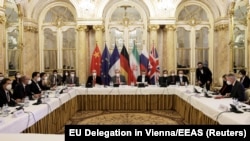Update: Shortly after this fact check was posted, news came that the Iran nuclear talks in Vienna had been paused. Additional information has been added.
**
On March 9, one of Russia’s top nuclear officials weighed in on the ongoing talks to persuade Iran to limit its nuclear program to peaceful uses.
“Russia has always been a driving force, not an obstacle in the course of the negotiations,” said Mikhail Ulyanov, Kremlin ambassador to the International Atomic Energy Agency (IAEA).
That is false.
China, France, Germany, Russia, the United Kingdom and the United States are trying to salvage an agreement reached with Iran in 2015 to limit its nuclear program. The deal has been in jeopardy since former President Donald Trump pulled the United States out in 2018.
Now, Russia has invaded Ukraine and is suffering under fierce sanctions from the U.S and other Western countries. On March 5, Russian Foreign Minister Sergei Lavrov said the sanctions were a hurdle for the Iran talks and demanded that the measures not affect Russian trade with Iran.
Ulyanov aimed to clarify Lavrov’s demands. And it is true that for nearly a year, Russia has played a key role as a mediator, since the Iranians refuse to talk directly with their U.S. counterparts.
But Russia also has its own interests in mind, according to The Wall Street Journal. The newspaper reported on March 6 that because Russia has helped Iran avoid Western sanctions in the past, it is now hoping for Iran’s help in evading Western sanctions imposed because of the Ukraine war.
According to The Guardian, Russia has a short-term interest in postponing the Iran nuclear deal – to further push up world oil prices, which have surged since the war began. Higher prices mean more income for Russia from oil exports, and higher pump prices to torment the West.
The British newspaper said that finalizing a nuclear deal with Iran could free Iran to produce 2 million barrels of oil a day, helping to meet demand and temper the rising prices. U.S. President Joe Biden this week banned Russian oil imports to the U.S., and Britain said it would end them by 2023.
Russia supplies about 11 percent of the world’s oil and 40 percent of Europe’s natural gas. Industry sources told CNBC that Europe could fall into recession if Russia retaliates for Ukraine sanctions by cutting off energy supplies, and that could trigger a global economic pullback.
A top U.S. diplomat said Russia is trying to link the nuclear talks and Ukraine sanctions by demanding “unhindered” access to Iranian markets if an agreement is reached with Iran.
“Russia is trying to up the ante and broaden its demands … and we are not playing ‘let’s make a deal’,” Victoria Nuland, the State Department’s undersecretary for political affairs, told the U.S. Senate Foreign Relations Committee on March 9. According to The Hill news site:
“Nuland said negotiators in Vienna have 'nearly completed' an agreement on a pathway for the U.S. and Iran to return to compliance with the Joint Comprehensive Plan of Action (JCPOA), the formal name for the nuclear deal that former President Trump withdrew from in 2018.
“But Russian and Iranian officials in recent days have issued statements laying out hard-line demands and casting doubt on the potential of the talks concluding.”
A spokesperson for French President Emmanuel Macron called Russia’s demands “blackmail.”
On March 6, U.S. Secretary of State Antony Blinken called the Russian demands “irrelevant.”
“The [Ukraine] sanctions that are being put in place and that have been put in place on Russia have nothing to do with the … Iran nuclear deal and the prospects of getting back into that agreement,” Blinken said on CBS’s “Face the Nation”.
On March 8, The New York Times reported that negotiators were close to signing a revived Iran nuclear deal, and that Russian demands that trade with Iran be excluded from Ukraine sanctions had “put up a hurdle that some fear may scuttle any agreement.”
The newspaper added that Iran and China may not want to go ahead with the nuclear deal without Russia’s approval even though it’s not needed.
Even Iranian negotiators questioned Russia’s demands. Mohammad Marandi, an adviser in Iran’s delegation to the nuclear talks in Vienna, told Al Jazeera the Iranians are waiting for clarification from the Russians.
For its part, the Russian Embassy in Iran tweeted on March 9 that the nuclear talks in Vienna “should take into account the legitimate interests of Russia in the implementation of comprehensive cooperation with Iran.”
On March 11, The New York Times reported that the negotiations had been put on hold. The Times said:
"Josep Borrell Fontelles, the foreign policy chief of the European Union, which chairs the talks in Vienna, confirmed what he described as a 'pause' in the talks 'due to external factors.'
“ 'A final text is essentially ready and on the table,' he said in a Twitter message, adding that he would continue to work with negotiators to 'overcome the current situation and to close the agreement.' ”





